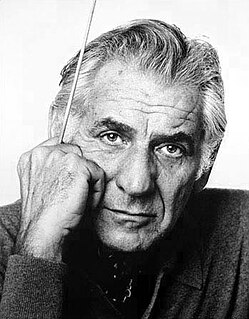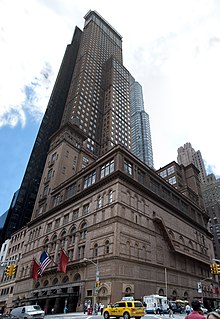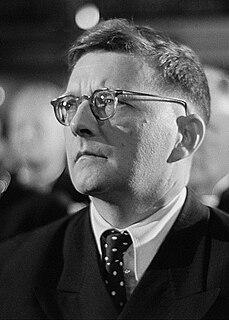Related Research Articles

Leonard Bernstein was an American composer, conductor, pianist, music educator, author, and lifelong humanitarian. He was one of the most significant American cultural personalities of the 20th century. According to music critic Donal Henahan, he was "one of the most prodigiously talented and successful musicians in American history".
Ellen Taaffe Zwilich is an American violinist, composer and academic teacher, the first female composer to win the Pulitzer Prize for Music. Her early works are marked by atonal exploration, but by the late 1980s she had shifted to a post-modernist, neo-romantic style. She has been called "one of America's most frequently played and genuinely popular living composers." She was a 1994 inductee into the Florida Artists Hall of Fame. Zwilich has served as the Francis Eppes Distinguished Professor at Florida State University.

Kirill Petrovich Kondrashin, was a Soviet and Russian conductor.

Yevgeny Aleksandrovich Mravinsky was a Soviet and Russian conductor.
Dmitri Shostakovich composed his Symphony No. 4 in C minor, Opus 43, between September 1935 and May 1936, after abandoning some preliminary sketch material. In January 1936, halfway through this period, Pravda—under direct orders from Joseph Stalin—published an editorial "Muddle Instead of Music" that denounced the composer and targeted his opera Lady Macbeth of Mtsensk. Despite this attack, and despite the oppressive political climate of the time, Shostakovich completed the symphony and planned its premiere for December 1936 in Leningrad. After rehearsals began, the orchestra's management cancelled the performance, offering a statement that Shostakovich had withdrawn the work. He may have agreed to withdraw it to relieve orchestra officials of responsibility. The symphony was premiered on 30 December 1961 by the Moscow Philharmonic Orchestra led by Kirill Kondrashin.

The Orpheus Chamber Orchestra is a classical music chamber orchestra based in New York City. They have won several Grammy Awards. It is known for its collaborative leadership style in which the musicians, not a conductor, interpret the score.
Philip Smith is an American classical trumpet player. He is former Principal Trumpet with the New York Philharmonic and played with the orchestra from 1978 to 2014. Smith, born in the United Kingdom, is from a Salvation Army background. He assumed the co-principal position in the New York Philharmonic in June 1978 and the principal position in 1988. He also is a supporter of brass bands, performing with various groups of distinction.
Christopher Chapman Rouse III was an American composer. Though he wrote for various ensembles, Rouse is primarily known for his orchestral compositions, including a Requiem, a dozen concertos, and six symphonies. His work received numerous accolades, including the Kennedy Center Friedheim Award, the Grammy Award for Best Classical Contemporary Composition, and the Pulitzer Prize for Music. He also served as the composer-in-residence for the New York Philharmonic from 2012 to 2015.
Oscar Ravina, born in Warsaw, Poland, was a violinist, violin teacher and concertmaster based in New York, who has had a prolific career as a performer as well as being a current professor emeritus at Montclair State University, where a talent grant in his name is regularly given to outstanding full-time freshmen studying string instruments.

The Leningrad première of Shostakovich's Symphony No. 7 took place on 9 August 1942 during the Second World War, while the city of Leningrad was under siege by Nazi German forces.
The Symphony No. 2 is a composition for orchestra by the American composer Ellen Taaffe Zwilich. The work was composed in 1985 on a commission from the San Francisco Symphony. It was first performed on November 13, 1985, by the San Francisco Symphony under the direction of Edo de Waart, to whom the piece is dedicated.
The Symphony No. 3 is a symphony for orchestra by the American composer Ellen Taaffe Zwilich. The work was commissioned by the New York Philharmonic to commemorate their sesquicentennial anniversary. It was first performed by the New York Philharmonic conducted by Jahja Ling on February 25, 1993. The symphony is dedicated "with love and admiration" to Kurt Masur and the New York Philharmonic.
The Symphony No. 5 "Concerto for Orchestra" is a composition for orchestra by the American composer Ellen Taaffe Zwilich. The work was commissioned by the Juilliard School in honor of Bruce Kovner and Suzie Kovner with support of the Trust of Francis Goelet. It was first performed by the Juilliard Orchestra conducted by James Conlon at Carnegie Hall on October 27, 2008.
The Concerto for Piano and Orchestra is a composition for solo piano and orchestra by the American composer Ellen Taaffe Zwilich. The work was written on a commission from Carnegie Hall, the Detroit Symphony Orchestra, and the League of American Orchestras. It was the first composition ever commissioned by either Carnegie Hall or the League of American Orchestras. The world premiere was performed by the pianist Marc-André Hamelin and the Detroit Symphony Orchestra under the direction of Günther Herbig at the Meadow Brook Music Festival in Rochester Hills, Michigan, on June 26, 1986. The piece is dedicated to Günther Herbig.
The Concerto Grosso 1985 is a composition for chamber orchestra by the American composer Ellen Taaffe Zwilich. The work was commissioned by the Washington Friends of Handel in commemoration of the 300th anniversary of the birth of George Frideric Handel. It was given its world premiere by Handel Festival Orchestra conducted by Stephen Simon on May 9, 1986.
The Concerto for Oboe and Orchestra is a composition for oboe solo and orchestra by the American composer Ellen Taaffe Zwilich. The work was commissioned by the Cleveland Orchestra in honor of their principal oboist John Mack's 25th year with the orchestra. It was first performed by Mack and the Cleveland Orchestra under the direction of Christoph von Dohnányi on January 17, 1991. The piece is dedicated "with affection" to John Mack.
The Chamber Symphony is a symphony for chamber ensemble by the American composer Ellen Taaffe Zwilich. It was commissioned by the music ensemble Boston Musica Viva, which first performed the work under the direction of Richard Pittman on November 30, 1979. The work is cast in a single movement and has a duration of approximately 17 minutes in performance.
The Concerto for Bassoon and Orchestra is a bassoon concerto written by the American composer Ellen Taaffe Zwilich. The work was commissioned by the Pittsburgh Symphony Orchestra for their principal bassoonist Nancy Goeres. It was given its world premiere by Goeres and the Pittsburgh Symphony Orchestra under the direction of Lorin Maazel in Heinz Hall for the Performing Arts, Pittsburgh, on May 13, 1993. The piece is dedicated to Maazel, Goeres, and the Pittsburgh Symphony Orchestra.
The American Concerto is a trumpet concerto written by the American composer Ellen Taaffe Zwilich. The work was commissioned by the California Center for the Arts, Escondido, the San Diego Symphony, the Virginia Symphony Orchestra, the Buffalo Philharmonic Orchestra, and the trumpeter Doc Severinsen, to whom it is dedicated. The piece was completed in New York on June 12, 1994, and was given its world premiere by Doc Severinsen and the San Diego Symphony under the direction of JoAnn Falletta in Escondido, California, on September 24, 1994.
Millennium Fantasy for Piano and Orchestra is a piano concerto written by the American composer Ellen Taaffe Zwilich. The work was commissioned by the pianist Jeffrey Biegel in association with the Adele Marcus Foundation, the Abraham J. & Phyllis Katz Foundation, the South Florida Council of the Chopin Foundation of the United States, Isa and Marvin Leibowitz, the American Music Center, and a consortium of 27 American orchestras. It was first performed by Jeffrey Biegel and the Cincinnati Symphony Orchestra under the direction of Jesús López Cobos in Cincinnati on September 22, 2000.
References
- 1 2 3 Zwilich, Ellen Taaffe (1988). "Symbolon". Theodore Presser Company . Retrieved August 4, 2020.
- ↑ F. Anthony, Wayne (February 3, 2018). "Toledo Symphony has big plans for the coming year". The Blade . Retrieved August 6, 2020.
- ↑ Henahan, Donal (June 15, 1988). "Festival Review/Music; 20th-Century Program By the Philharmonic". The New York Times . p. 21.
- ↑ Zakariasen, Bill (June 15, 1988). "A Classical Token of Friendship". New York Daily News . Tribune Publishing. p. 42.
- ↑ Croan, Robert (April 17, 1998). "Symphony performance runs cold and hot". Pittsburgh Post-Gazette . John Robinson Block. p. 23.